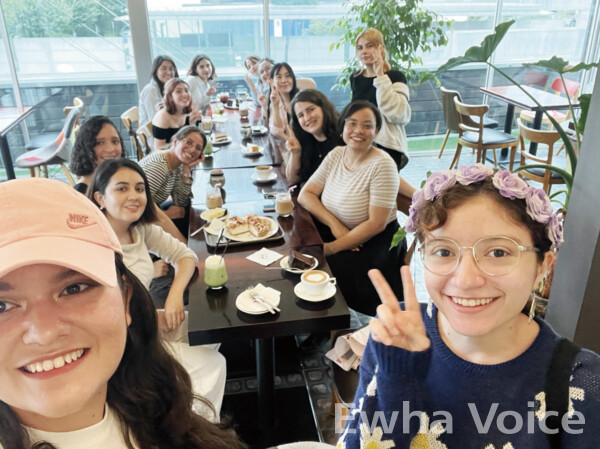
As Korea emerges into a multicultural country with an increasing number of international students, Ewha Womans University takes part in embracing the diversity among the student body. In accordance with Ewha’s vision to foster female global talents, there are 1,417 international students studying at Ewha as of 2023 according to Higher Education in Korea.
In order to support these students, school-backed programs and communities offer ways to embrace diversity. One program the International Student Affairs Team provides is Ewha MATE, a one-on-one mentoring program where mentors assist their mentees in adapting to their life at Ewha.
Karla Delgado, a freshman from the Department of Political Science & International Relations, joined Ewha MATE as a mentee. Coming from Ecuador, Delgado was able to receive guidance from her mentor before school started.
“I was stressed because I did not want to be lost on the first day of school,” Delgado said. “But my mentor took me around campus to help me get used to the buildings.”
Apart from Ewha MATE, other associations are also forming communities of diverse nationalities.
Ewha Kyrgyz-Kazakh Students, which consists of 42 members from Kyrgyzstan and Kazakhstan, is an association that focuses on building relationships within the community.
Daulet Adelya, a senior from the Division of Communication & Media and member of the association, explained that the community focuses on active interaction as well as sharing information via KakaoTalk.
“We usually do fun activities like going out for dinner and holding a movie night,” Daulet said.
Similarly, Ewha’s official Latin American Students Association (AELA), which consists of roughly 43 students from Latin America, focuses on building connections. Lorrany Mendanha Bastos, a current member of AELA from the Graduate School of International Studies, shared that coming from Brazil, she was thrilled to join AELA at Ewha after studying in a Korean Language Center in Daegu for a year.
“I was the only Latin student in my language center at Daegu,” Mendanha Bastos said. “So coming to Ewha and learning that there is a community I could culturally connect to was exciting news to me.”
According to Susan Sofia Sarmiento Ortiz, co-vice president of AELA and a sophomore from the Division of International Studies, AELA not only aims to strengthen their community but also seeks to share their culture.
“The taco booth we opened for the Daedong Festival this spring was special in that it was our first big activity in showing our culture,” she said. “We were able to share our cuisine and show our music and language.”
To continue these efforts at cultural exchange, Stefany Antonelly Ayo Ramirez, co-vice president of AELA and a sophomore majoring in psychology, announced that they are preparing to open a bachata night, where Latin dances are taught.
“It will be an official cultural exchange, opening the registration to non-members as well,” she said.
Not all associations are active with fixed events held every semester. Some associations simply act as a supporting community. One such group is Ewha’s Thai Student Association.
“We do have gatherings together at the start of the semester, but after that, it is the group chat in LINE where most information is exchanged with no extra events held,” said Nicha Homrossukhon, a senior from the Divsion of International Studies and president of the association.
Although she is already used to life in Korea, Phongphibool Pim, a Thai sophomore from the Division of Communication & Media, shared that the presence of a Thai community was enough to make her feel supported.
Furthermore, there is also a community focused on the interaction between Korean and international students, such as Ewha P.I.E., a club that is dedicated to sharing cultural experiences.
Kim Yeram, president of Ewha P.I.E. and a sophomore from the Department of Nutritional Science & Food Management, joined the club out of curiosity of whether the cultures reflected in the media were different from reality.
“One time, I asked a French member if French people really ate dinner for three solid hours,” Kim shared. “I was surprised to hear that it was only on special occasions like family dinner and that she was actually a fast eater.”
Despite these success stories marking Ewha’s efforts at fostering diversity, there is always room for improvement.
Daulet pointed out the difficulty international students face in joining non-English clubs. On the same page, Phongphibool wanted to join other clubs but struggled to find information about them. Kim agreed and suggested the creation of a website dedicated to gathering information on clubs that international students can easily refer to.
Apart from access and information difficulties, another issue Ewha’s diverse communities are facing is funding. Maria Jose Munoz Leon, president of AELA and a senior majoring in food science and biotechnology, expressed the hardships she faced in getting financial support from the school. The recent change of financial policy announced by the International Student Affairs Team limited funding only to be provided for two meetings per semester. Not knowing the exact limits to the budget, Munoz Leon suggested it would be better if a specific budget was set every semester to allow groups to plan ahead.

